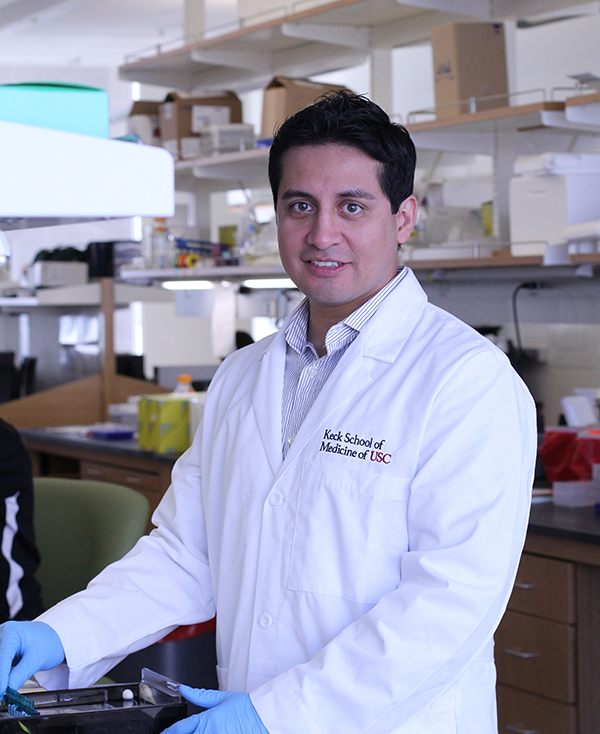
For this year’s Broad Fellow, Gabriel R. Linares, science is personal.
“I have to say the turning point that spiked my interest in science was when I was in high school, and my grandfather suffered a stroke,” he said. “I remember going to the hospital, and he was just incapacitated. There was not really any effective treatment for him. The need for discovering new medical treatments for these patients stimulated my interest in biomedical research.”
As a Broad Fellow in the USC Stem Cell laboratory of Justin Ichida, Linares is seeking innovative therapies for patients with a different neurological problem: amyotrophic lateral sclerosis (ALS), also known as Lou Gehrig’s disease. In ALS, patients suffer from the death of the cells that transmit signals from the brain to the muscles, called motor neurons, leading to progressive paralysis and usually resulting in fatal respiratory failure within three to five years of diagnosis.
In the most common form of ALS, patients have a specific mutation, in which their DNA contains hundreds of extraneous repetitions in a gene called C9ORF72. To understand why this particular mutation causes ALS, Linares is studying diseased motor neurons derived from patients’ skin or blood cells. He is also exposing these motor neurons to thousands of potential drugs to see if any of them halt or reverse the progression of the disease.
“Any drugs that you test in these patient-specific motor neurons could potentially be easily translated to the clinic,” he said.
The clinic is never far from Linares’ mind. After receiving his bachelor’s degree in neurobiology, physiology and behavior from the University of California, Davis, he researched the role of newly discovered genes that regulate bone formation and breakdown as a PhD candidate in the laboratory of Subburaman Mohan at Loma Linda University. For this work, he won a young investigator award from the American Society for Bone and Mineral Research.
“Even after being completely absorbed in your research project, you have to step back and look at how the grand scheme of your work will contribute towards the advancement of scientific knowledge for a given disease and ultimately benefit a patient population,” said Linares. “As an additional motivating factor, I would often look at videos of people with osteoporosis to remind myself about the disabling aspects of this disease.”
Although he enjoyed his doctoral studies, his longstanding interest in neuroscience led him to pursue a four-year postdoctoral fellowship in De-Maw Chuang’s laboratory at the National Institutes of Health (NIH). As part of the lab’s molecular neurobiology section, Linares investigated whether preconditioning stem cells with the drugs lithium and valproic acid could improve their effectiveness as a treatment for Huntington’s disease, an inherited condition in which the brain’s neurons progressively degenerate.
Following Chuang’s retirement, Linares is continuing his training in neuroscience and stem cell biology in the Ichida Lab at the Eli and Edythe Broad Center for Regenerative Medicine and Stem Cell Research at USC.
He is thrilled to join the ranks of the Broad Fellows, exceptional senior postdoctoral researchers at the transition point of starting their own stem cell laboratories. The fellowship was established as part of a $2 million gift from The Eli and Edythe Broad Foundation to USC’s stem cell research center.
“It’s a distinct honor, and I am privileged to be selected as the recipient for the Broad Fellowship,” said Linares. “I applaud the foundation for their continued generosity and support of stem cell research at USC.”
